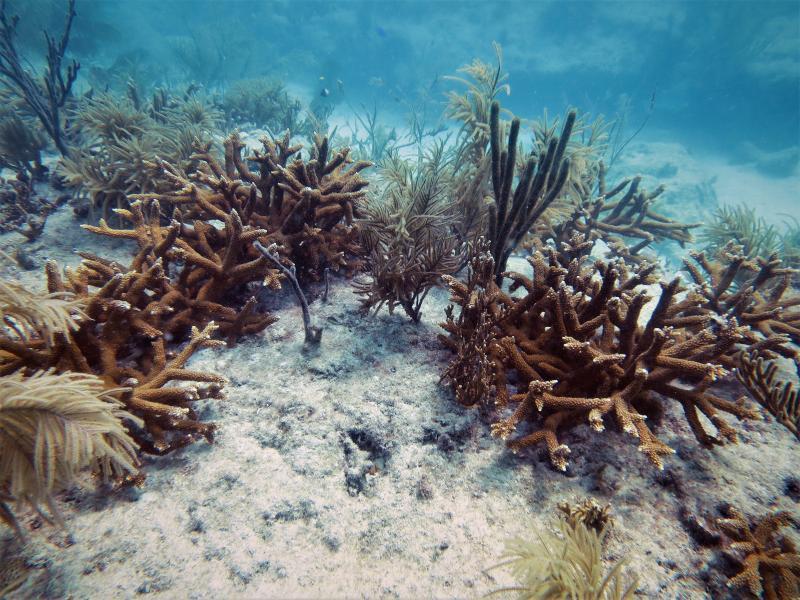
More than $910,000 recommended for Ruth Gates Coral Restoration Innovation Grants Projects
by NOAA Fisheries 26 Jul 2023 19:52 UTC

Restored staghorn coral (Acropora cervicornis) at Looe Key reef in the Florida Keys National Marine Sanctuary. Staghorn coral, along with elkhorn coral and star corals, built Caribbean coral reefs over the last 5,000 years © U.S. Geological Survey
NOAA is committed to working with partners to save and restore the world's coral reefs. To support this mission, we have recommended funding for one new project and have awarded continued funding to four ongoing, multi-year projects under the Ruth Gates Coral Restoration Innovation Grants.
The 2023 recommended and awarded funding totals approximately $913,000. It will support projects that enhance coral resilience and improve the long-term success and efficiency of shallow-water coral reef restoration in a changing climate.
Globally, the health of coral reefs is rapidly declining. We have learned much about how to scale up coral restoration efforts in the past several years. However, we need to continue to develop innovative interventions to restore resilient, genetically diverse, and reproductively viable coral populations at a larger scale.
Newly Recommended Project
The University of Alabama will work with Mote Marine Laboratory and the University of Delaware to collect algal fluorescence data using a low-cost, non-lethal optical tool. Algal fluorescence correlates to the bleaching response in elkhorn and staghorn coral, which are heavily used in reef restoration projects throughout the Florida Keys and the Caribbean. The data will be used to optimize a model for accurately predicting coral thermal tolerance.
Projects Awarded Continued Funding
The University of Miami will continue to assess the feasibility of increasing the genetic diversity of elkhorn corals by cross breeding them with other Caribbean-sourced corals. This work will support restoration of elkhorn coral populations in Florida.
Florida International University will continue to investigate the feasibility of improving restoration and enhancing coral resilience by attempting to make corals withstand increased temperatures.
The University of Southern California, working with the Mote Marine Laboratory, will continue to quantify the thermal tolerance of nursery-reared elkhorn corals and identify genomic signatures associated with key thermal resilience traits.
Nova Southeastern University, working with the Florida Aquarium, Mote Marine Laboratory, and the University of North Carolina, Wilmington, will continue to determine the optimal light in which to grow sensitive coral recruits. This work will support efforts to rapidly and effectively upscale production of diverse corals for coral reef restoration.
Ruth Gates Coral Restoration Innovation Grants
The Ruth Gates Coral Restoration Innovation competition is in direct response to the National Academies of Sciences, Engineering, and Medicine study on Interventions to Increase the Resilience of Coral Reefs. The NOAA Coral Reef Conservation Program funds these innovation grants, a part of NOAA's effort to restore resilient coral ecosystems, while honoring the life and work of Dr. Ruth Gates. Learn more about the Ruth Gates Coral Restoration Innovation Grants.
Disclaimer: At this point in the selection process, the application approval and obligation of funds for the new award is not final. This application is being "recommended" for funding. This is not authorization to start the project and this is not a guarantee of funding.